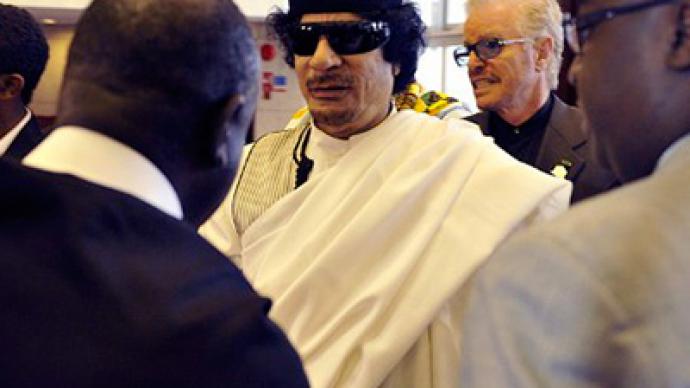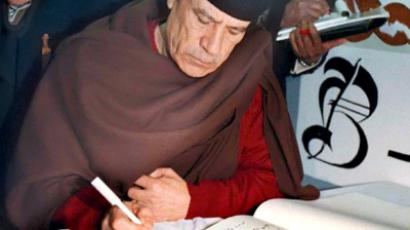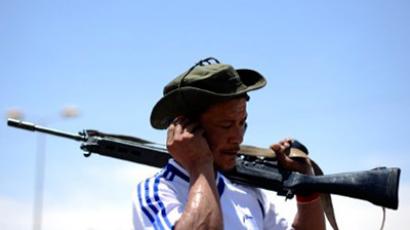Gaddafi’s arrest ordered by International Criminal Court

The International Criminal Court (ICC) in The Hague has issued an arrest warrant for Muammar Gaddafi. The Libyan leader is suspected of crimes against humanity.
Two other persons wanted by the tribunal are his son Seif al-Islam, who commands one of the Libyan Army’s divisions, and Abdullah al-Sanousi, head of the country’s intelligence.Gaddafi and his associates are suspected of crimes against Libyan civilians, committed as the government was trying to quell the uprising in the country’s east in February 2011. The request for the order was sent to the ICC on May 16.Libyan authorities have already said that they do not recognize the decision of the ICC, claiming they have not signed the Rome Treaty that set up the court. On Sunday, the Libyan Foreign Ministry announced that the issuing of the arrest warrant is not under the jurisdiction of the International Criminal Court and that the ICC is set against African countries. Konstantin Kosachev, chairman of the State Duma's Foreign Affairs Committee, explained to RT why the ICC arrest warrant cannot be applied to the Libyan leader. ”The decision of the International Criminal Court is not legally binding for Libya, for a simple reason – Libya is not a member state of the court, and as long as Mr. Gaddafi stays on Libya’s territory, this decision cannot be fulfilled,” said Kosachev. The ICC, however, says the Libyan authorities have to comply with their sanctions because the request for an arrest warrant was forwarded to the ICC by the UN Security Council, and Libya has to obey the UN Security Council resolutions. The International Criminal Court was established to prosecute officials who have committed crimes against humanity or genocide, if their own country cannot do so. This is only the second time the ICC has issued an arrest warrant for an acting head of state. In 2009 it ordered an arrest warrant for the President of Sudan, Omar al-Bashir. However, that order has not been implemented yet or put into action. In the meantime, the bombing of the Libyan capital by NATO forces continues. There were reports of an extremely heavy artillery fire on Monday morning. The bombs allegedly fell near Gaddafi’s compound and not too far from the hotel where the international journalists are staying. In March, the UN Security Council imposed a no-fly zone over Libya and allowed attacks against Libyan troops in order to protect civilians.The mandate has been abused by the NATO-led coalition, some activists and officials say, resulting in a bombing campaign aimed at ousting Gaddafi from power or killing him.The NATO operation in Libya is met with increasing criticism from military and political observers who say the bombings bear no fruit, as Gaddafi remains defiant and there is no evident progress. The world is now watching to see whether the ICC decision to issue an arrest warrant for Gaddafi will have any significant effort on the situation in Libya.
Eric Denécé, a co-author of an independent report into the war in Libya, believes the decision by the ICC is not very reasonable, as the only thing it does is that it closes “one more possibility of negotiation between Gaddafi and the other side of the Benghazi TNC [Transitional National Council]”. “There’s no way to arrest Gaddafi, because he is living in his bunker in Bab al-Aziziya in Tripoli and is very well protected. And if we don’t send any troops, any invasion forces, it’s absolutely impossible to have Gaddafi. So, this is only one more way to threaten the Libyan leader, but it’s only a promise,” said Denécé.
The decision by the ICC to issue an arrest warrant for Gaddafi is a way to assure the public that the operation in Libya is justified and to legitimize the use of foreign troops on the ground, argues William Engdahl, author of “Full Spectrum Dominance: Totalitarian Democracy in the New World Order.”“In the United States the population doesn’t understand it [the military actions in Libya],” he said. “They say, ‘What are we doing in another war here? This is a Nobel Peace Prize president. We’re in Afghanistan, we’re still very heavily involved in Iraq, and now we’re going into Libya. This is madness.’ I think it’s propaganda to prop up the sense of justice behind this – and a very flimsy one at that. It’s politically motivated.”
Patrick Hayes, a London-based reporter for the online magazine Spiked, claims the arrest warrant will only lead to an escalation of fighting in the country, as it puts Gaddafi in a desperate position. “Ultimately, what this does, it actually shuts off any possible escape routes for him, so it means that he’s in a place where he’s going to have to fight till the very end now, and live up to his promise to fight and die on Libyan soil,” said Hayes. “This shouldn’t be any business of the International Criminal Court, this should be for the Libyan people to resolve their affairs with Gaddafi,” he added.














